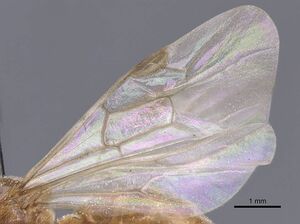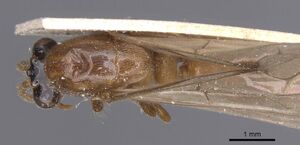Aenictus alluaudi
| Aenictus alluaudi | |
|---|---|

| |
| Scientific classification | |
| Kingdom: | Animalia |
| Phylum: | Arthropoda |
| Class: | Insecta |
| Order: | Hymenoptera |
| Family: | Formicidae |
| Subfamily: | Dorylinae |
| Genus: | Aenictus |
| Species: | A. alluaudi |
| Binomial name | |
| Aenictus alluaudi Santschi, 1910 | |
| Subspecies | |
| |
Identification
Distribution
Latitudinal Distribution Pattern
Latitudinal Range: -0.1° to -20.16667°.
| North Temperate |
North Subtropical |
Tropical | South Subtropical |
South Temperate |
- Source: AntMaps
Distribution based on Regional Taxon Lists
Afrotropical Region: Democratic Republic of Congo, Kenya (type locality), Zimbabwe.
Distribution based on AntMaps
Distribution based on AntWeb specimens
Check data from AntWeb
Countries Occupied
| Number of countries occupied by this species based on AntWiki Regional Taxon Lists. In general, fewer countries occupied indicates a narrower range, while more countries indicates a more widespread species. |

|
Estimated Abundance
| Relative abundance based on number of AntMaps records per species (this species within the purple bar). Fewer records (to the left) indicates a less abundant/encountered species while more records (to the right) indicates more abundant/encountered species. |

|
Biology
Castes
Known only from males.. Table of castes known for all Afrotropical Aenictus species.
Images from AntWeb
 
| |
| Syntype of Aenictus alluaudi. Male (alate). Specimen code casent0911415. Photographer Will Ericson, uploaded by California Academy of Sciences. | Owned by NHMB, Basel, Switzerland. |
      
| |
| . | |
Nomenclature
The following information is derived from Barry Bolton's Online Catalogue of the Ants of the World.
- alluaudi. Aenictus bottegoi var. alluaudi Santschi, 1910g: 754, fig. 10 (m.) KENYA.
- Type-material: 5 syntype males.
- [Note: Baroni Urbani, 1977e: 66, cites 2m syntypes NHMB.]
- Type-localities: 4 males Kenya (“Afrique orientale anglaise”): Victoria-Nyanza, Kisoumou, ix.1904 (Ch. Alluaud) (invalid restriction of type-locality by Wheeler, W.M. 1922a: 751; no lectotype designated), 1 male Kenya: Nairobi (Wa-Kikouyou), ix.1904 (Ch. Alluaud).]
- Type-depositories: MNHN, NHMB.
- Subspecies of bottegoi: Santschi, 1914b: 67; Wheeler, W.M. 1922a: 751; Santschi, 1935b: 266.
- Status as species: Santschi, 1924b: 203; Bolton, 1995b: 58; Hita Garcia, et al. 2013: 201.
- Distribution: Kenya, Zimbabwe.
- Current subspecies: nominal plus falcifer.
Description
References
- Santschi, F. 1910g. Nouveaux dorylines africains. Rev. Suisse Zool. 18: 737-759 (page 754, fig. 10 male described)
- Santschi, F. 1924b. Descriptions de nouveaux Formicides africains et notes diverses. II. Rev. Zool. Afr. (Bruss.) 12: 195-224 (page 203, raised to species)
References based on Global Ant Biodiversity Informatics
- Baroni Urbani C. 1977. Katalog der Typen von Formicidae (Hymenoptera) der Sammlung des Naturhistorischen Museums Basel (2. Teil). Mitt. Entomol. Ges. Basel (n.s.) 27: 61-102.
- Hita Garcia F., E. Wiesel, G. Fischer. 2013. The ants of Kenya (Hymenoptera: Formicidae)faunal overview, first species checklist, bibliography, accounts for all genera, and discussion on taxonomy and zoogeography. Journal of East African Natural History 101: 127-222.
- IZIKO South Africa Museum Collection
- Santschi F. 1935. Hymenoptera. I. Formicidae. Mission Scientifique de l'Omo 2: 255-277.
- Wheeler W. M. 1922. Ants of the American Museum Congo expedition. A contribution to the myrmecology of Africa. VIII. A synonymic list of the ants of the Ethiopian region. Bulletin of the American Museum of Natural History 45: 711-1004

